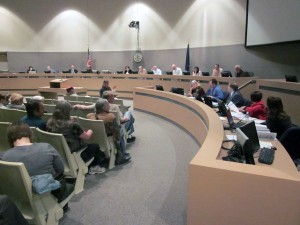
The Anchorage Assembly passed a rewritten version of Anchorage’s election law Tuesday night. But some other election issues went to the Ethics Board for review.
The Anchorage Assembly worked on several election-related items. They updated the city’s election law after making a handful of amendments. One amendment that drew a lot of attention limits poll watchers’ use of electronic devices. They are not allowed to make or receive phone calls in the polling area or to photograph or record confidential information there. Additional amendments removed references to the Accu-vote election system and replaced them with the more general term optical scan system. The Assembly also added language to insure that poll watchers could observe during setup and tear down at polling places. And they extended the time for a recount from five to nine days. Officials began reviewing the law after problems with an election in 2012.
The Assembly also referred a new version of an ordinance crafted by Assembly member Chris Birch to the Municipal Board of Ethics. The ordinance would change the election date. The substitute version includes a new section that would allow Assembly members to participate in official actions on matters in which they have a substantial financial interest. They scheduled a public hearing on both of those for February 11th.
SOC
Daysha Eaton is a contributor with the Alaska Public Radio Network.
Daysha Eaton holds a B.A. from Evergreen State College, and a M.A. from the University of Southern California. Daysha got her start in radio at Seattle public radio stations, KPLU and KUOW. Before coming to KBBI, she was the News Director at KYUK in Bethel. She has also worked as the Southcentral Reporter for KSKA in Anchorage.
Daysha's work has appeared on NPR's "Morning Edition" and "All Things Considered", PRI's "The World" and "National Native News". She's happy to take assignments, and to get news tips, which are best sent via email.
Daysha became a journalist because she believes in the power of storytelling. Stories connect us and they help us make sense of our world. They shed light on injustice and they comfort us in troubled times. She got into public broadcasting because it seems to fulfill the intention of the 4th Estate and to most effectively apply the freedom of the press granted to us through the Constitution. She feels that public radio has a special way of moving people emotionally through sound, taking them to remote places, introducing them to people they would not otherwise meet and compelling them to think about issues they might ordinarily overlook.




